|
|
|
Sort Order |
|
|
|
Items / Page
|
|
|
|
|
|
|
| Srl | Item |
| 1 |
ID:
142646
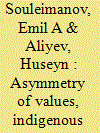

|
|
|
|
|
| Summary/Abstract |
This article fills the gap in existing scholarship on asymmetric conflict, indigenous forces, and how socio-cultural codes shape the dynamics and outcomes of conflict transformation. Specifically, it identifies three key socio-cultural values commonplace in honorific societies: retaliation, hospitality, and silence. As sources of effective pro-insurgent violent mobilisation and support from among the local population, these values provide insurgents with an asymmetric advantage over much stronger incumbents. Using the case studies of the two Russian counterinsurgencies in Chechnya, the article shows the mechanisms on the ground through which Moscow’s deployment of indigenous forces against insurgents helped to stem the tide of conflict, reversing the insurgents’ initial advantage in terms of asymmetry of values.
|
|
|
|
|
|
|
|
|
|
|
|
|
|
|
|
| 2 |
ID:
137161
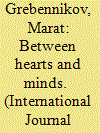

|
|
|
|
|
| Summary/Abstract |
Although Russian authorities point to the supposed success of Britain’s late colonial counter-insurgency campaigns as a model even in the 21st century, their grasp of the historical lessons is partial at best. This article considers the applicability and relevance of the counter-insurgency experience of the late British colonial state to present-day ethno-religious conflicts in the North Caucasus. The article suggests that the flexibility of British arrangements for counter-insurgency was a major factor in achieving long-term stability for the gradual transition to indigenous self-rule. The key practice was to devolve responsibility and power to indigenous elites operating with a high degree of autonomy. The article then proposes guidelines relevant to the conditions of the present and the near future that will affect prospects both for full-fledged democratization of Russia and for effective state-building, also vitally important for the development of the North Caucasus. The article concludes that the most relevant factor in the British counter-insurgency experience is to win the hearts and minds of the population. However, this cannot be achieved without a legitimate indigenous administration capable of taking full responsibility and ownership of the campaign. Otherwise, diminished political access and accountability create propitious conditions for adherents of radical movements, who are increasingly capable of and prepared to use violence and who are the only de facto rival political forces within the Russian Federation.
|
|
|
|
|
|
|
|
|
|
|
|
|
|
|
|
| 3 |
ID:
178561
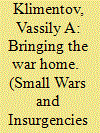

|
|
|
|
|
| Summary/Abstract |
Terrorism connected to the North Caucasus has been pervasive in Russia between 1992 and 2018. Based on an original dataset, this article presents statistics on rates of terrorist attacks outside of the North Caucasus, their geography and targets, and the tactics used. It argues that terrorism by North Caucasian insurgents has long retained a strategic logic despite their conversion to radical Islamism. Accordingly, the end of North Caucasian terrorism was determined by the erosion of its strategic character as an increasingly vague ideological project replaced concrete political goals among the insurgents.
|
|
|
|
|
|
|
|
|
|
|
|
|
|
|
|
| 4 |
ID:
166667
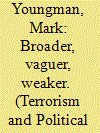

|
|
|
|
|
| Summary/Abstract |
In October 2007, veteran Chechen field commander Dokka Umarov proclaimed the formation of the Caucasus Emirate (IK), formalising the victory of the North Caucasus insurgency’s Islamist wing over its nationalist-separatists. During Umarov’s time as leader, the North Caucasus experienced sustained violence and the IK claimed responsibility for multiple terrorist attacks in and beyond the region. However, despite the importance of ideology in understanding insurgent behaviour, the IK’s ideology and Umarov’s role in shaping it remain understudied. Using Social Movement Theory’s concept of framing to analyse Umarov’s communiqués throughout his lengthy tenure (June 2006–September 2013), this article identifies three distinct phases in Umarov’s ideological positioning of the insurgency: nationalist-jihadist (June 2006–October 2007); Khattabist (October 2007–late 2010); and partially hybridised (late 2010–September 2013). The article contributes to debates over typologies of jihadist actors by highlighting the difficulties in applying them to the North Caucasus and provides a clearer understanding of the IK’s ideological transformation and the limits to its engagement with external actors. The article also illustrates that weakness was a key factor in explaining that transformation and identifies several avenues for research that could further enhance our understanding of the IK’s ideology and the role it plays.
|
|
|
|
|
|
|
|
|
|
|
|
|
|
|
|
| 5 |
ID:
111112
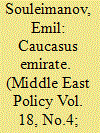

|
|
|
| 6 |
ID:
107237
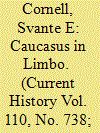

|
|
|
|
|
| Publication |
2011.
|
| Summary/Abstract |
"The fallout of Russia's invasion of Georgia has yet to be seriously addressed;Armenia and Azerbaijan are edging toward a new war; and the situation in the North Caucasus is going from bad to worse."
|
|
|
|
|
|
|
|
|
|
|
|
|
|
|
|
| 7 |
ID:
065891
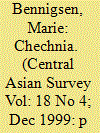

|
|
|
| 8 |
ID:
068867
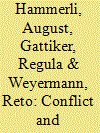

|
|
|
| 9 |
ID:
065692
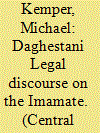

|
|
|
| 10 |
ID:
167783
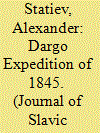

|
|
|
|
|
| Summary/Abstract |
This article examines the Dargo expedition, an episode of the Caucasus War waged in 1817–1864 by Russia against the tribes of the North Caucasus. In 1845, Tsar Nicholas I ordered a raid in the depth of the mountains controlled by rebels led by imam Shamil. The expedition, targeting the village of Dargo, Shamil’s residence, was to lure the tribesmen into a decisive battle, which the Russians were expected to win and thus destroy the protracted insurgency. However, the expedition ended in a spectacular failure, because its planners ignored the challenges of mountain warfare. The article focuses on these challenges and shows how the rebels’ skill in mountain warfare triumphed over the great superiority in numbers, firepower, and discipline enjoyed by the Russians.
|
|
|
|
|
|
|
|
|
|
|
|
|
|
|
|
| 11 |
ID:
191082
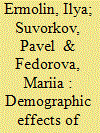

|
|
|
|
|
| Summary/Abstract |
This article explores how the deportation of the Dargin people in the Caucasus affects intergenerational fertility rates and assesses the results of the experiment. The authors paid attention to two Dargin settlements located in the foothills and Mid-Mountains areas of Dagestan, the first of which was subject to forced replacement, but the other was left intact. Inhabitants of both settlements have close kinship ties and are tied by commodity trade as well. The authors obtained data through municipal registers and an additional survey conducted in the studied localities. We used event history analysis as the main methodology. The main findings cover the following: the foothill settlers managed to keep the social norms along with handicrafts that existed before deportation which brought about the intergenerational continuity in procreative behaviour and higher childbirth rates in the foothill settlement that have persisted for a long time.
|
|
|
|
|
|
|
|
|
|
|
|
|
|
|
|
| 12 |
ID:
129091
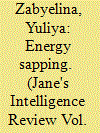

|
|
|
| 13 |
ID:
144773
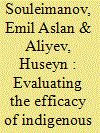

|
|
|
|
|
| Summary/Abstract |
This study seeks to identify factors conducive to the (in)efficacy of indigenous forces (IF) in counterinsurgency (COIN) operations in Russia’s republics of Chechnya and Dagestan. Empirically, it is the first study to offer an examination of the deployment of IF in the North Caucasus-based COIN. The findings of this article emphasize that the effectiveness of COIN in Chechnya, unlike Dagestan, is conditioned by a number of factors pertaining to the structural and organizational characteristics of IF. Of these, the IF’s experience as former insurgents, their access to insider information, and their loyalty to incumbents – often maintained by the threat of collective punishment – have proven decisive for a relatively successful COIN in Chechnya.
|
|
|
|
|
|
|
|
|
|
|
|
|
|
|
|
| 14 |
ID:
139992
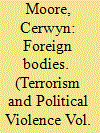

|
|
|
|
|
| Summary/Abstract |
This article examines foreign fighters and the insurgency in the North Caucasus. The first part of the article addresses conceptual issues concerning the ways that foreign fighters are analysed, posing this more widely in terms of transnational activism. Here I examine the importance of kin and relatedness. I develop this argument in the second part of the article, which examines pan-Islamism and transnational activism in the post-Soviet period. The third section draws attention to the different groups of foreign fighters, as part of a wider activist movement in the North Caucasus. Here I show that a complex group of transnational activists from the Greater Middle East, North Africa, parts of Europe, and Central Asia participated in the conflicts in the North Caucasus. Finally, the article turns to examine volunteers from the North Caucasus who travelled to fight in Syria, concluding with some considerations about the reintegration of returnees and former activists.
|
|
|
|
|
|
|
|
|
|
|
|
|
|
|
|
| 15 |
ID:
096697


|
|
|
|
|
| Publication |
2010.
|
| Summary/Abstract |
Since 9/11, counterinsurgency is back in fashion; the 'war on terror' has even been branded a 'global counterinsurgency'. However the context within which counterinsurgency originally arose is critical to understanding the prospects for its present success; the radically changed environment in which it is currently being conducted casts into considerable doubt the validity of the doctrine's application by many national militaries currently 'rediscovering' this school of military thought today. Above all, classical counterinsurgency was a profoundly imperial, state-centric phenomenon; consequently it only rarely faced the thorny issue of sovereignty and legitimacy which bedevils and may doom these same efforts today.
|
|
|
|
|
|
|
|
|
|
|
|
|
|
|
|
| 16 |
ID:
065822
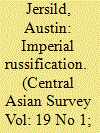

|
|
|
| 17 |
ID:
144772
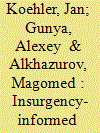

|
|
|
|
|
| Summary/Abstract |
In this article we analyse the dynamics of the insurgencies and the corresponding counter-insurgency measures in the North Caucasus over the past 25 years. By comparing three cases – Chechnya, Dagestan, and Kabardino-Balkaria – we identify similarities and differences in the way insurgencies and counter-insurgency measures influence governance in the region. Analysing different dynamics and outcomes under similar framework conditions – a federal state with a centralised government trying to govern a region with a shared history of rebellions against central rule and with similar geographic, social, and cultural features facilitating resistance and insurgencies – is a promising approach to better understanding conditions and implications of insurgency-induced governance in post-Soviet Russia.
|
|
|
|
|
|
|
|
|
|
|
|
|
|
|
|
| 18 |
ID:
099787
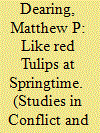

|
|
|
|
|
| Publication |
2010.
|
| Summary/Abstract |
In an era where female suicide terrorism is on the rise in conflict regions such as the Middle East, the North Caucasus, and South Asia, why has Afghanistan been largely immune to this trend? Why do some violent groups use female suicide terrorism and others avoid it? This is a critical question for policy makers and analysts attempting to understand a dangerous terrorist phenomenon and how it may evolve in Afghanistan. During the anti-Soviet jihad, narratives were woven of men and women marching through the mountains of Nuristan to "offer their blood for the Islamic revolution like red tulips at springtime." But today, women are wholly absent from the Taliban and their jihad in Afghanistan. This article analyzes, in particular, the absence of women in Taliban martyrdom operations. There are three primary findings from this study that explain the low propensity for female suicide bombers in Afghanistan. First, a permissive social and geographic environment in Afghanistan gives insurgents freedom of mobility and a resistance capacity characterized by a reduced necessity for female suicide bombers; second, the capacity of a fiercely conservative culture restricts female participation in both Afghan society and within insurgent organizations; and third, the pronounced absence of a female culture of martyrdom limits women from participation in insurgent actions and narratives.
|
|
|
|
|
|
|
|
|
|
|
|
|
|
|
|
| 19 |
ID:
129138
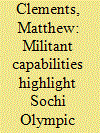

|
|
|
| 20 |
ID:
127932
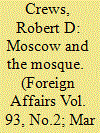

|
|
|
|
|
| Publication |
2014.
|
| Summary/Abstract |
If Russians were holding their breath in the run-up to the 2014 Winter Olympics, it was with good reason. A Black Sea spa town long favored by Kremlin apparatchiks, Sochi occupies a perilous position on Russia's southern frontier, just 50 miles west of the North Caucasus Federal District, a cauldron of ethnic strife, nationalist separatism, and state repression since the collapse of the Soviet Union. In the last two years alone, violence in this vast mountainous region, including car bombings, assassinations, and clashes between Muslim fighters and Russian security forces, has killed or injured more than 1,500 people.
|
|
|
|
|
|
|
|
|
|
|
|
|
|
|
|
|
|
|
|
|